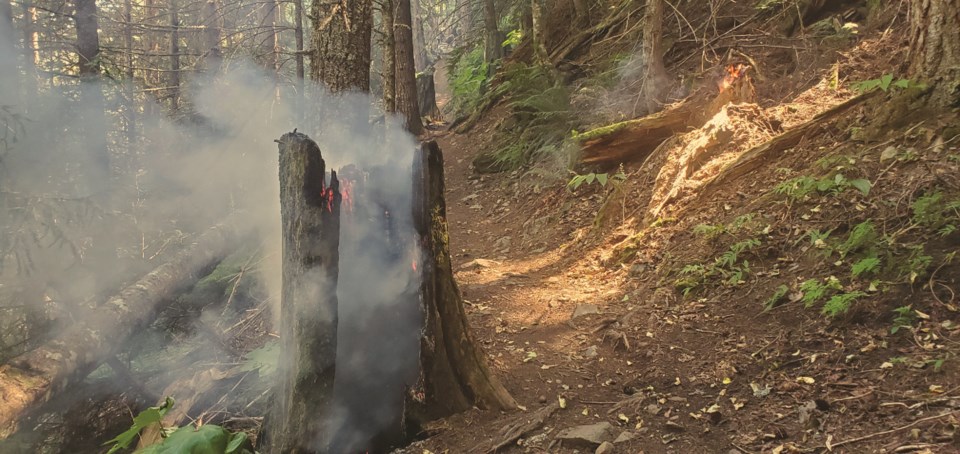A small fire at the top of Whistler’s Alpine Meadows neighbourhood on the afternoon of Monday, July 27 could potentially have been much worse if not for some fast-acting Whistlerites.
Alpine resident Frank Salter said he could already smell the smoke when he got a call from a friend on Green Lake—coincidentally also a paid on-call firefighter.
“He phoned me to ask if my house was on fire, because they could see smoke rising from right in my vicinity,” Salter said.
After a quick investigation, Salter found a pair of tree stumps engulfed in flames on either side of the Mandatory Suicide bike trail near Alpine Way.
“We grabbed all the neighbours and my friends and called the fire department, who had already been alerted by my buddy on the lake,” Salter said.
“Then we ran back with buckets and an axe and started chopping up the stump, and watered it.”
The group of six formed a small “bucket brigade” from a nearby creek and managed to quell the flames by the time Whistler Fire Rescue Service (WFRS) crews arrived to finish the job and clean up remaining hotspots.
The quick response from residents “most definitely” prevented the fire from growing, said WFRS deputy chief Chris Nelson.
“That’s a positive takeaway,” Nelson said.
“We do have eyes and ears around this valley, and people are hyper sensitive, and the call came in with a whiff of smoke.”
That said, the event is a “cautionary tale,” he added.
“There was lots of people out there, we got it really early, and that’s the whole key,” he said.
“But the fire started anyways.”
While no cause has been determined, it’s possible it was improperly discarded smoking materials, Nelson said.
“The thought is it was near the head of the trail, and someone sat down and had something before they went for a bike ride, and put it away incorrectly,” he said.
With the resort experiencing the first real bout of hot weather this year and crowds returning to Whistler en masse, what is Nelson’s level of comfort right now?
“As you can imagine, I don’t sleep as well as I normally do on a nice winter’s day, when there’s no immediate threat to the valley,” he said.
But some changes to BC Wildfire’s approach this year have eased his anxiety somewhat, he added.
“This year they’ve gone to the model of ‘let’s hit it hard and let’s hit it quickly,’ so it’s a much better response model,” Nelson said.
“That makes me sleep better.”
But with Whistler’s fire danger rating at high and likely to reach extreme soon, locals and visitors alike need to stay vigilant.
“Be diligent; call 911 without hesitation,” Nelson said, adding that if the fire is still small, you can try to contain it with water or dirt.
When calling in a fire, particularly in the backcountry, it’s important to give good coordination—Nelson recommended staying in the general location if possible.
“So tell us where it is, but better yet, stay there with your cell phone on so we can call you back to know exactly where it is,” he said.
Report all fires in Whistler by calling 911.
Outside of Whistler, call 1-800-663-5555 (*5555 on a cell phone).
Find more information at whistler.ca/wildfire.




